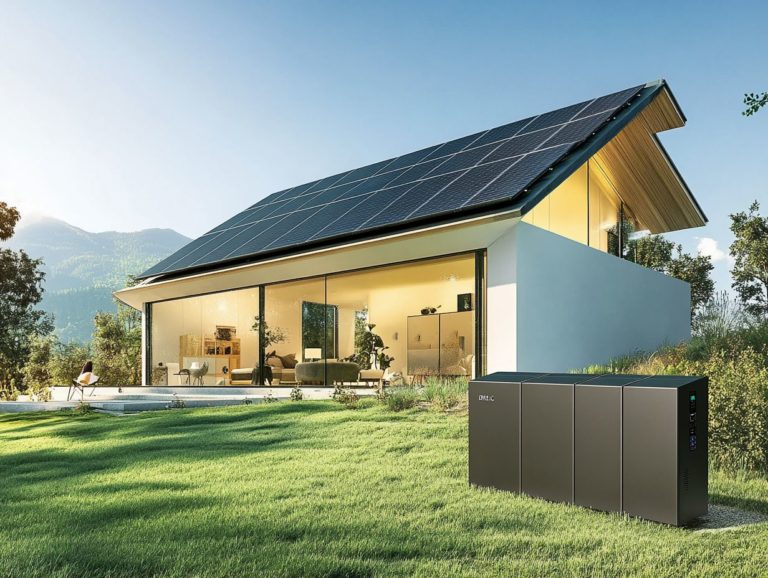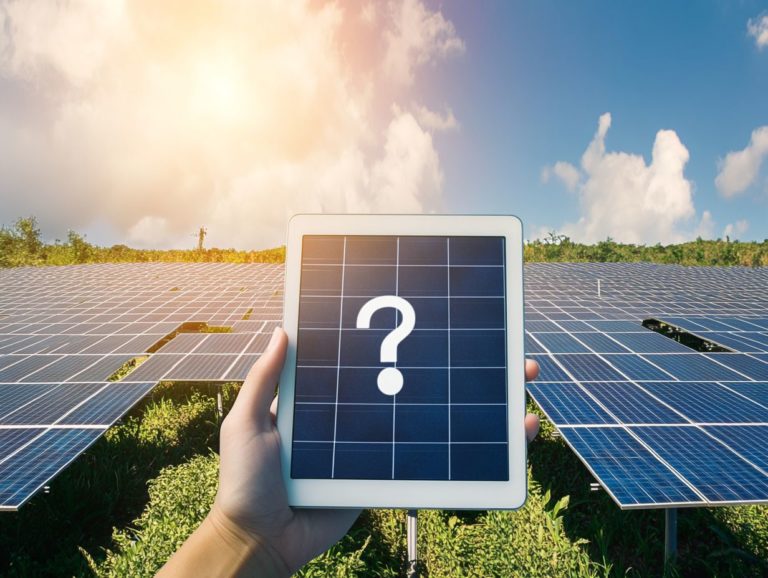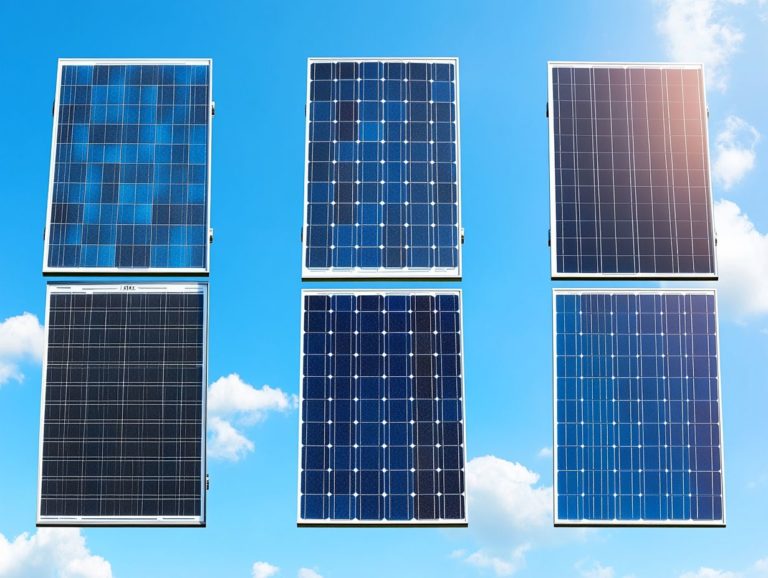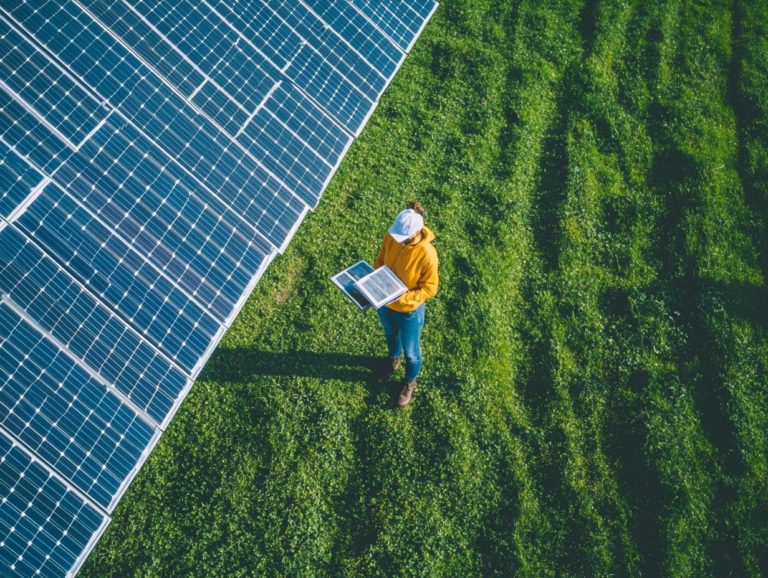“5 Ways Solar Energy Can Increase Home Value”
Considering a switch to solar energy? You re not merely opting for an eco-friendly choice; you have the opportunity to significantly enhance your home s value in a multitude of compelling ways.
By lowering your energy bills, unlocking enticing tax incentives, and boosting your home s appeal in a market that increasingly prioritizes sustainability, solar energy becomes more than just a technological investment it s a strategic move for your property.
Let s explore five exciting advantages of solar energy that can boost your property s worth, along with valuable insights on costs, maintenance, and ways to maximize your benefits.
Explore how solar could transform your financial future and enrich your living space!
Contents
- Key Takeaways:
- 1. Lower Energy Bills and Increased Savings
- 2. Tax Incentives and Rebates
- 3. Increased Demand for Eco-Friendly Homes
- 4. Potential for Net Metering
- 5. Added Resale Value
- Is Solar Energy Worth the Investment?
- What Are the Different Types of Solar Energy Systems?
- How Much Does It Cost to Install Solar Panels?
- What Are the Maintenance Requirements for Solar Panels?
- What Are the Environmental Benefits of Solar Energy?
- How Can Homeowners Maximize the Benefits of Solar Energy?
- Frequently Asked Questions
- What is solar energy and how does it increase home value?
- What are the 5 ways solar energy can increase home value?
- How does solar energy reduce energy costs?
- What sustainable features does solar energy add to a home?
- Do solar energy systems require maintenance?
- How can solar energy increase a home’s resale value?
Key Takeaways:

- Switching to solar energy can significantly lower energy bills and save homeowners money in the long run.
- Take advantage of tax incentives and rebates now to make your solar panel investment more affordable.
- With an increasing demand for eco-friendly homes, adding solar panels can make your property more attractive to potential buyers.
1. Lower Energy Bills and Increased Savings
Investing in solar panels can dramatically lower your energy costs. This provides monthly savings that enhance your financial stability while minimizing your carbon footprint.
By harnessing solar energy, you can experience a significant reduction in your utility bills, leading to substantial economic benefits and long-term savings. This makes solar companies an appealing choice for those who are environmentally conscious.
These savings become especially noteworthy in areas with elevated electricity rates, where traditional energy costs can place a considerable strain on your household budget.
With a variety of solar leasing options available, you can often install solar panels with little to no upfront costs, opting instead to pay a fixed monthly fee. This arrangement not only grants you immediate access to renewable energy but also provides you with predictable expenses, eliminating the unpredictability of conventional utility bills.
Ultimately, this initiative not only enables you financially but also contributes to a more sustainable future.
2. Tax Incentives and Rebates
You can take full advantage of a variety of tax incentives and rebates, including the federal solar tax credit, to ease the initial investment costs of solar energy systems while championing an eco-friendly lifestyle.
By tapping into these programs, along with state-level incentives that differ by region, you can significantly lower your out-of-pocket expenses as you switch to renewable energy. These rebates often cover a substantial percentage of installation costs, making solar panels a more enticing option for many homeowners.
Local governments may also offer extra perks, such as property tax exemptions or performance-based incentives, further enhancing the financial allure of adopting solar energy.
With these financial supports in place, you’re likely to discover that solar systems are not only feasible but also a compelling choice for sustainable living.
3. Increased Demand for Eco-Friendly Homes
The rising demand for solar energy has sparked interest in eco-friendly homes, as today s home buyers increasingly prioritize sustainability and energy efficiency. This trend reflects a deeper awareness of environmental impact and enhances the market value of properties equipped with solar panels.
Research shows that homes with solar energy systems can experience a market value increase of up to 4.1% compared to similar homes lacking these installations.
Many buyers are ready to pay a premium for energy-efficient features, establishing a strong link between green technology and real estate appeal.
As more individuals embrace cleaner living and renewable energy sources, the housing market is evolving, creating unique opportunities for realtors and builders to meet this burgeoning demand.
Find out how you can start your solar journey today!
4. Potential for Net Metering
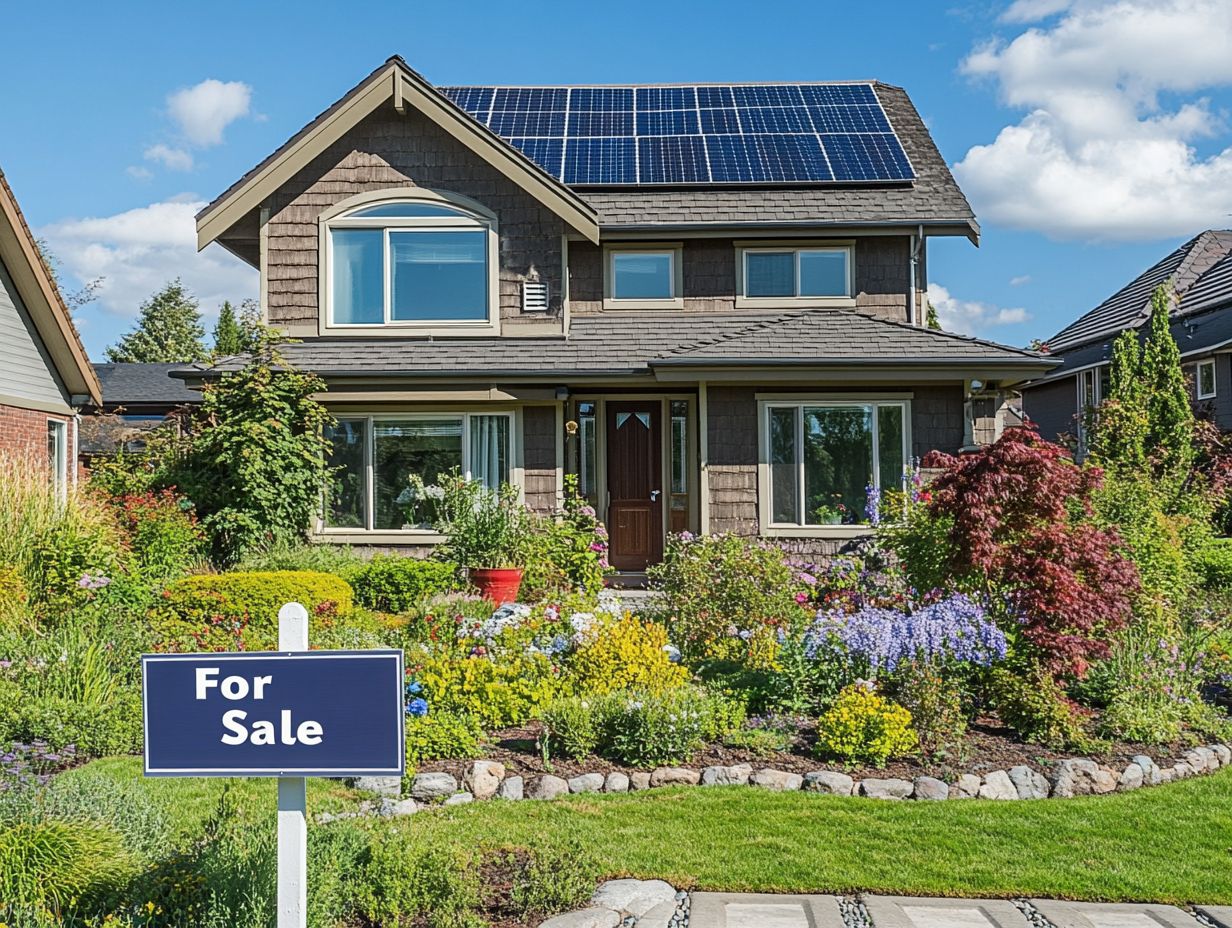
Net metering is a great opportunity for homeowners to use solar energy effectively. You can earn credits for the extra energy your solar panels produce, leading to significant savings.
This system allows you to send surplus electricity back to the grid. As you generate more energy than you consume, these credits accumulate, reducing your monthly utility expenses.
Keep in mind that net metering rules can vary by location. Some states offer robust programs that maximize savings, while others may not be as favorable.
Understanding these regulations is crucial. They can significantly affect the financial benefits of your solar panel installation.
5. Added Resale Value
Installing a solar system not only saves energy but also boosts your home’s resale value. This makes your property more attractive to buyers in today s market.
Research shows homes with solar energy systems can sell for more. The Lawrence Berkeley National Laboratory reports an average increase of about $15,000 in resale value.
Real estate agents confirm this trend, noting that properties with solar panels can sell up to 20% faster. As buyers prioritize eco-friendly features, having solar systems becomes an important selling point.
Is Solar Energy Worth the Investment?
Deciding if solar energy is worth the investment means examining installation costs against potential savings. Consider federal solar tax credits and long-term benefits like lower maintenance costs and energy storage options.
Analyzing these factors clarifies the financial picture. While installation costs can be high, often ranging from several thousand to tens of thousands of dollars, savings on utility bills may offset these expenses over time.
Federal tax credits can significantly lower the net installation cost. Adding solar batteries also enhances efficiency and energy independence, allowing you to store excess energy for later use.
What Are the Different Types of Solar Energy Systems?
You have several options for solar energy systems, including solar panels that convert sunlight into electricity, batteries for energy storage, and systems that heat water. Each system meets different energy needs and preferences.
It s essential to understand these systems for effective renewable energy use. Solar panels reduce monthly energy bills and lower your carbon footprint.
Pairing these panels with batteries lets you store extra energy generated during sunny days for use when it’s cloudy or dark.
Solar thermal systems heat water using sunlight, which is great for hot water needs. Assess your energy use, budget, and space to find the best solar solution for your lifestyle.
How Much Does It Cost to Install Solar Panels?

The cost of installing solar panels varies based on several factors, including system size, location, and your chosen solar company. You can offset these costs through the federal solar tax credit and enjoy lower upkeep costs over time.
Many states and utilities offer their own rebates beyond federal incentives, which can significantly reduce your overall investment for installation. The size of a typical residential system, which usually ranges from 5 to 10 kilowatts (a measure of power), is crucial in determining your costs. Larger systems may require a higher upfront investment but often lead to greater savings in the long run.
Your location plays a vital role as well; solar panel efficiency can be affected by local climate and sunlight availability. Fortunately, the ongoing upkeep for solar systems is generally minimal, further reducing your expenses compared to traditional energy sources that often come with continuous fuel costs and various utility fees.
What Are the Maintenance Requirements for Solar Panels?
Upkeep for solar panels is typically minimal, allowing you to enjoy the benefits of solar energy without incurring significant ongoing costs.
Regular cleaning is essential to keep your panels performing at their best, especially if they re installed in areas prone to dust or pollen. Neglecting to clean them can lead to dirt and debris accumulation, significantly hindering energy production. Periodic inspections are crucial for this reason.
During these inspections, a professional can identify shading issues, damaged panels, or electrical concerns, allowing you to nip potential problems in the bud. The average cost for cleaning and inspection services usually falls between $100 and $300 annually an incredibly small investment when considering long-term efficiency gains and potential energy savings.
Protect your investment by dedicating a little time and effort to these straightforward maintenance tasks to maximize the lifespan of your solar system.
What Are the Environmental Benefits of Solar Energy?
Solar energy significantly reduces your household’s carbon footprint and offers a wealth of environmental benefits while promoting an eco-friendly lifestyle. By decreasing your reliance on fossil fuels, you actively lower greenhouse gas emissions.
Unlike traditional energy sources that often pollute air and water, solar power harnesses the sun’s abundant energy without releasing harmful pollutants into the atmosphere. This clean energy alternative enhances air quality and plays a crucial role in combating climate change, making it essential for sustainable development.
By transitioning to solar energy, you sidestep the harmful extraction processes associated with coal, oil, and natural gas, contributing to a healthier planet for future generations. Embrace renewable energy sources like solar to envision a cleaner, greener world, ensuring the preservation of vital ecosystems.
How Can Homeowners Maximize the Benefits of Solar Energy?
If you re a homeowner eager to maximize the benefits of solar energy, significantly enhance your energy efficiency by strategically using solar systems and batteries to optimize both consumption and storage.
Start by assessing your daily energy usage patterns to align your solar energy production with peak consumption times. Implement a system to track energy use, ensuring any excess energy generated during the day is stored in your solar batteries for later use, especially in the evenings when demand spikes.
Investing in energy-efficient appliances and LED lighting makes a substantial difference, as they consume less power and allow you to make the most of your solar energy.
You can enhance performance by regularly maintaining your solar panels and batteries, providing you with a sustainable energy solution that reduces your reliance on traditional power sources.
Frequently Asked Questions
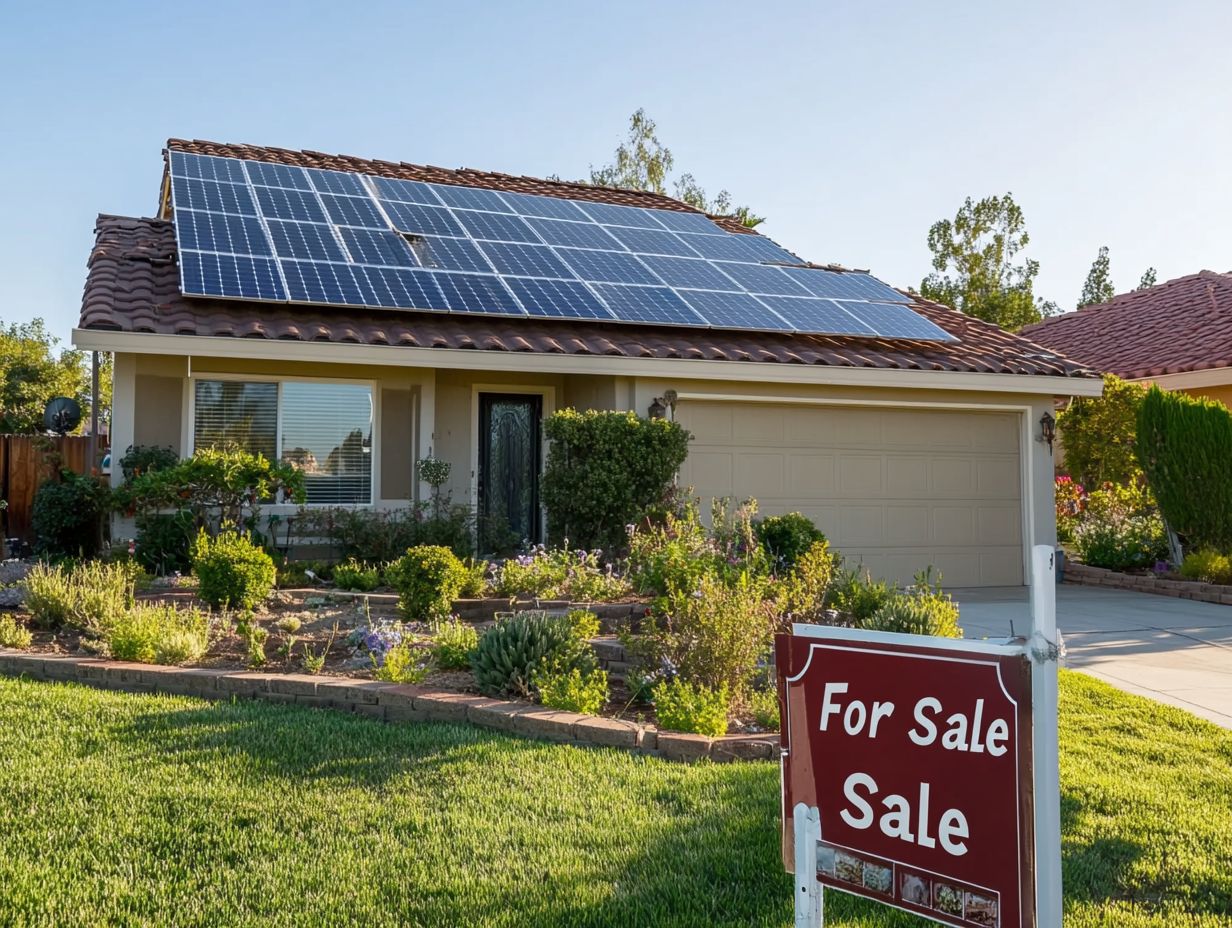
What is solar energy and how does it increase home value?
Solar energy comes from the sun and is captured using solar panels. This renewable energy can raise your home s value by cutting energy bills and appealing to buyers who care about sustainability.
What are the 5 ways solar energy can increase home value?
- Reducing energy costs
- Boosting the home’s sustainable features
- Raising the resale value of the property
- Offering tax breaks and financial incentives
- Attracting eco-conscious buyers
How does solar energy reduce energy costs?
Solar systems convert sunlight into electricity, which can cut or even eliminate your reliance on traditional energy sources. This leads to lower monthly energy bills, making your home more attractive.
What sustainable features does solar energy add to a home?
Solar panels visibly showcase your home’s commitment to sustainability. They signal to buyers that the property is environmentally friendly and actively reducing its impact on the environment, which can boost its value.
Do solar energy systems require maintenance?
Yes, solar systems need some upkeep, like regular cleaning to maintain efficiency. However, this maintenance is minimal and manageable for homeowners or can be handled by professionals.
How can solar energy increase a home’s resale value?
Homes with solar energy systems appeal to buyers looking for cost-saving solutions as energy prices rise. With the growing trend toward sustainable living, these properties are increasingly desirable, leading to higher resale values.

